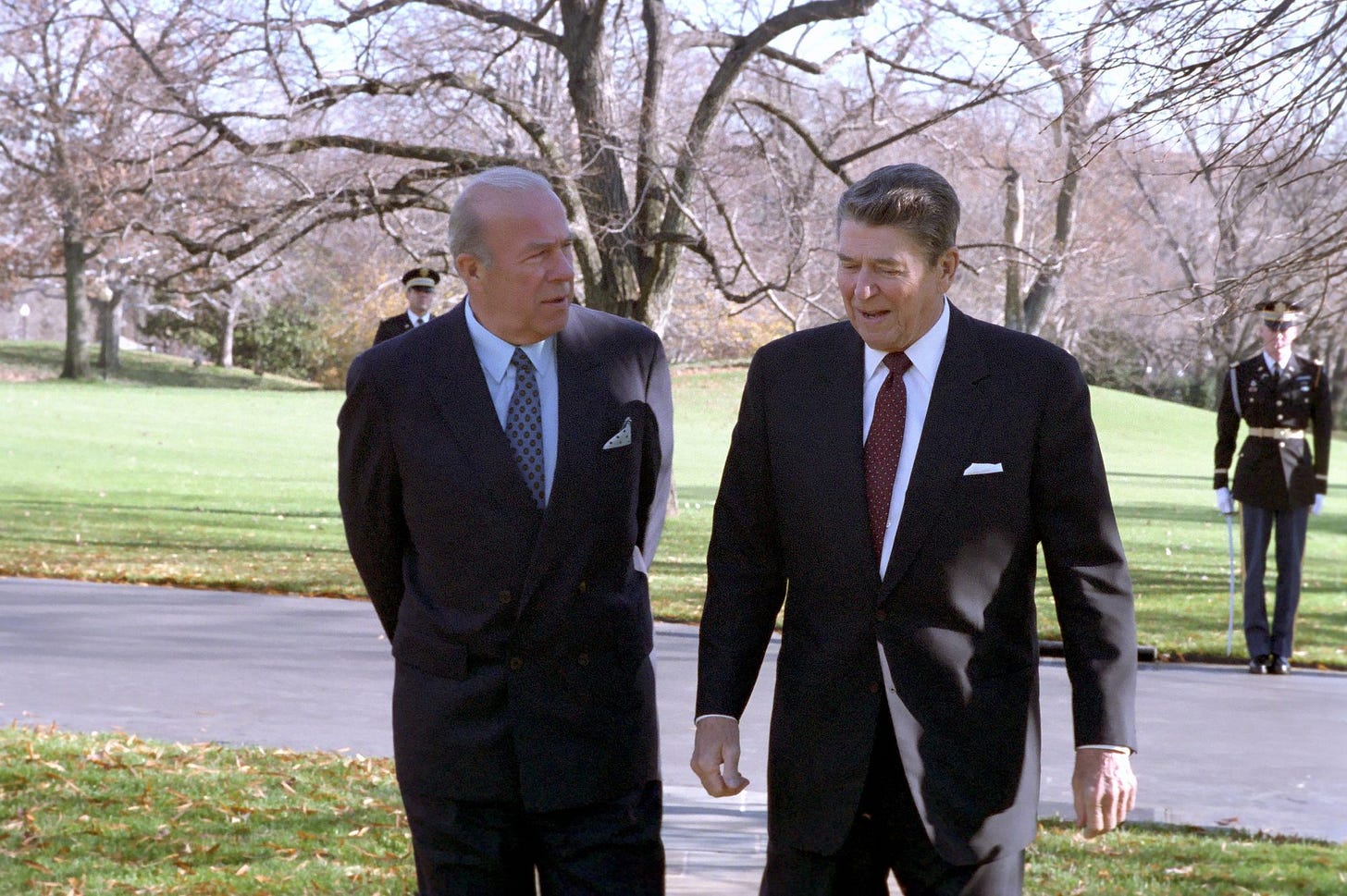The Passing of a Quiet American
George Shultz embodied a time before constant noise drowned out everyone’s voice.
Reading about the death of George P. Shultz, who was—among many, many other things—President Ronald Reagan’s secretary of state, was a reminder of not just another time but another world in American politics. Not that Shultz spent his life living in the past; quite the contrary. When Reagan’s second term ended, Shultz and his wife of some forty years, Obie (née Helena O’Brien), left Washington for California and took up a new life at Stanford’s Hoover Institution. Two years after Obie’s death in 1995, Shultz married again, to San Francisco’s former chief of protocol. The New York Times reported that the groom wore black tie and a shirt studded with red, white, and blue—ruby, diamond, and sapphire. He remained active in the city’s public life and in the world of policy until the time of his death.
My association with Shultz was derivative: He was a friend of my now-deceased husband, Leonard Garment, who was around Shultz’s age. The two men were totally unlike one another and totally similar. Len was a kid from Brooklyn, a jazz musician in his youth and what he called a tummler, with visible rough edges (though not so many as he pretended there were) camouflaging a highly educated brain. The Episcopalian Shultz had a very conventional upbringing in New Jersey, from which he decamped first to Princeton, then to the Marines, then to study economics at MIT. (For years a story went around that Shultz had a Princeton tiger tattooed on his rear. He would neither confirm nor deny.) The two men recognized each other right away. In public policy terms, they did a lot of business together.
During those years I was writing for the Wall Street Journal editorial page, and one of my favorite activities was to visit Shultz and use him as a source for a column. Because of Len, I had, as they say, preferred access. I would make my way to the State Department’s seventh floor—a treat in itself, built by the architect Allan Greenberg, than whom there is no better, and filled with 18th-century cabinetry—and into Shultz’s office, which was a kind of apotheosis of calm. There, the only limit on my interviews was the number of questions I could invent that would keep Shultz talking. I never got tired of listening to him.
Less than two years before he died, Shultz, still a relatively youthful ninety-eight years old, published a book titled, Thinking About the Future. On the cover is a close-up photo of him as a young Marine in the Pacific. In his face you can see part of what appealed to presidents from Eisenhower on down—the half-smile, the squint into the sun, the self-contained image of a characteristically American competence. The other part of the appeal was his voice—calm, considered, unflappable. He was certainly capable of losing his temper: He did so in front of Congress when Senators suggested that there just might be a conflict of interest between his role as Reagan’s secretary of state and his previous years with the Bechtel Group, a worldwide engineering firm. But, often as not, it was performance, not an actual loss of control.
In our conversations he would range from one topic to the next, sharing the products of several lifetimes of experience. He had more than a few: After the Marine Corps he got his Ph.D., then taught economics at MIT, taking a leave to work as a staffer for President Eisenhower’s Council of Economic Advisers. He moved to the University of Chicago, where he became dean of the business school. In 1969 he joined the Nixon Administration as secretary of labor (after AFL-CIO president George Meany had vetoed Pat Moynihan), then became the first head of the newly reorganized Office of Management and Budget. He left Washington just before Nixon’s 1974 resignation to take the Bechtel job, then returned as Reagan’s secretary of state when General Alexander Haig resigned the position in 1982.
Shultz made a reputation as a moderate among various collections of—what were they?—conservatives, or hawks, or hardliners, or whatever the contemporary label was for fellow officials who talked with a greater degree of certitude. In other company, he might not have seemed so middle-of-the-road; but he had a keen sense of self-preservation, not unlike that of Leonard Garment. Shultz got off the Iran-contra policy train very early and, thus, escaped much of the taint of the affair.
In later years, the acuity of his antennae declined. He embraced Elizabeth Holmes’ pitch for Theranos, which mainly demonstrates that getting old is a trial for almost everyone. When I knew him, though, his judgment and politics were impeccable. I wanted to listen to him approximately forever.
Suzanne Garment is senior editor of American Purpose.
Photo: National Archives: Reagan White House Photographs, 1/20/1981 - 1/20/1989 Collection: White House Photographic Collection, 1/20/1981 - 1/20/1989 - https://catalog.archives.gov/id/75855185, Public Domain, https://commons.wikimedia.org/w/index.php?curid=94754311


